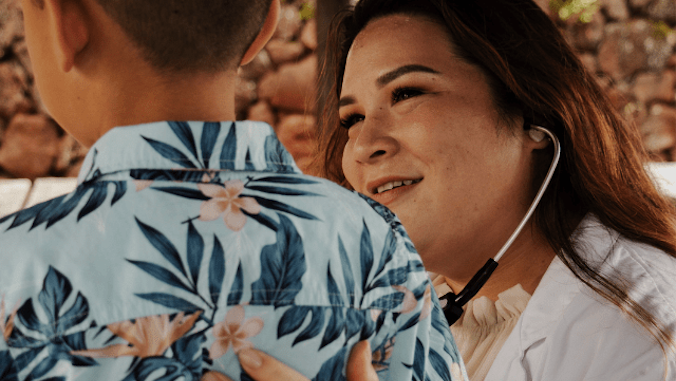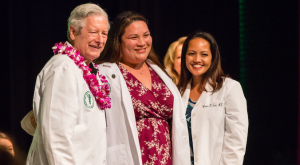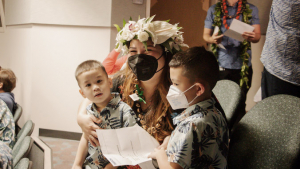
During her time in graduate school, Brittany Sato knew she wanted to give back to her community.
“I felt that medical school was the avenue in which I could contribute to my community and help people,” she said.
Sato, who hails from Nānākuli, is one of the few Native Hawaiian students who currently holds a PhD in cell and molecular biology, and now, her MD from the University of Hawaiʻi at Mānoa John A. Burns School of Medicine (JABSOM). Having grown up on West Oʻahu, Sato is familiar with the health disparities that affect rural communities, especially those with Native Hawaiian populations.

The Kamehameha Kapālama alumna ventured to University of Evansville in Indiana, where she earned her bachelor’s of science in biochemistry. When she returned to Hawaiʻi for graduate school, she took note of the health disparities of the Native Hawaiian community, which led her to apply for medical school.
She chose JABSOM, because “what better way to help my community by learning and training with the people here.” She was encouraged by the faculty and administrators and their dedication to give back to their respective communities.
In 2018, Sato completed JABSOM’s ʻImi Hoʻōla Post-Baccalaureate Program, crediting the program as a pivotal experience of her time in medical school. The year-long curriculum was rigorous, all while balancing her new family.
UH spring 2023 commencement schedule
“Having [my classmates and family] as a support group from the very beginning and throughout medical school was wonderful,” she said.
Sato’s highlights throughout medical school included assisting with a birth during her labor and delivery rotation, helping to diagnose a teenager with a rare congenital malformation during her third-year rotation and participating in Kuaʻola, a Native Hawaiian health program for her community health elective that allowed her to return to her hometown to give health education talks to middle school students.
Overcoming a bumpy journey
Admittedly, the road to obtaining her MD came with some challenges as well, such as balancing academics and family time and battling imposter syndrome. Her brief break from academics prevented her from graduating with her original cohort.

Thankfully, her support system helped her to navigate and overcome those obstacles she faced throughout her journey. She made sure to factor in as much family time as she could, and to also catch up with friends and mentors. Now reflecting on those experiences, Sato sees them as lessons that she’s learned—and still learning.
“At the end of your journey, patients aren’t going to ask how long you took to graduate medical school or what your class rank was,” she said. “The care you provide to your patients and how you treat them are most important. It’s okay to step back from school and take time for yourself and family because school will always be there and the support we receive from JABSOM is endless.”
Future pathologist
Originally, she set her sights on OB/GYN, but after the birth of her second son, she began to pivot her plans when she worked with Pathology Department Chair Karen Thompson and a third-year pathology resident. During her third-year rotations, Thompson informed her of gynecological pathology—a middle ground for the two fields. Sato enjoyed the process of collecting patients’ clinical information and piecing it together to determine potential diagnoses, and it was from that point that she chose to become a pathologist.
Don’t be afraid to be a non-traditional student, but be sure that your goal is always toward medicine, whether it be volunteering or working. Stay focused on your goals and work hard for it.
—Brittany Sato
Sato participated in the UH Mānoa fall 2022 commencement, but she is excited to partake in the graduation activities with her current cohort this May. In March, she was accepted into the UH Pathology Residency Program with a desire to serve the people of Hawaiʻi—a full-circle moment for Sato.
For aspiring physicians, Sato shared these words of wisdom: “Don’t be afraid to be a non-traditional student, but be sure that your goal is always toward medicine, whether it be volunteering or working. Stay focused on your goals and work hard for it. You need to want to achieve it and believe in yourself. Find mentors that are going to be able to help to guide you in achieving your goals. And finally, don’t compare yourself to anyone else.”

